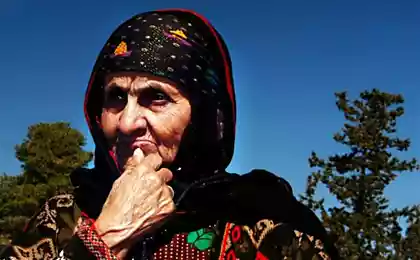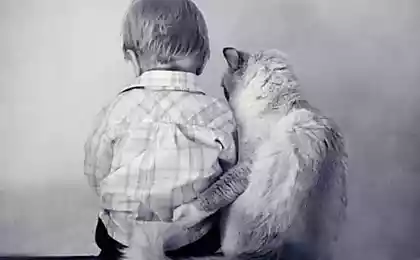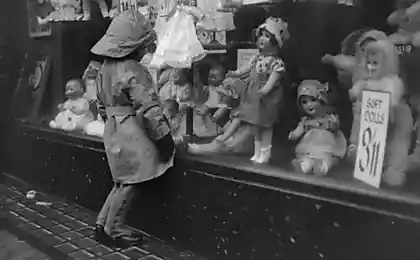416
And your children know how to formulate request?
I love watching the children, his and other people, to listen to what they say. And I noticed a trend — modern children do not know how to ask. Just can not formulate and ask something.
An elementary example. The child is at a party, playing with children, and suddenly says, "I'm thirsty!" To whom is he saying this? Yes, usually just into the void, into the space, expecting an immediate response, i.e., the appearance of a glass of water.

I basically such expressions are not paying attention and waiting for what will happen next. Further usually follows the repetition of the phrase, already addressed to me personally. To which I reply, "Great! What?"
Been here before some comes and they are making a request glass of water.
Some have to suggest: "You need my help? Want me to ask?" The funny thing is, when the child answers: "Yes, I don't know where you got cups," i.e., he does not understand what is requested. You have to explain and sort through — what is different from the statement of facts.
And like sometimes as much funny in such situations, and really sad. In my opinion, is very revealing of the child's behavior, caught in the system of child-centrism. He gets used, all that is given to him simply so, it should be a hint. Immediately caring mother/grandmother takes every whim, without even waiting for a real desire. But more often he's reminded every half hour that he wants to drink/eat/go to the toilet... And we're not talking about kids, no! I'm talking about school-age children — 6, 8, 10 years...
Why is it so important to be able to ask?
I think this is very important! Not just because I dwell on this moment of attention and try to work through it even with other people's children.
First, it is the articulation of their desires. The child must learn to understand what he wants, simple needs and feelings, to grow childish adults, to anything not seeking, and nothing wanting. And if you fulfill all the whims and needs of the baby, not even waiting for the appearance he desires, such a result can be obtained.
Problems with food behavior, so popular today, it is possible to grow from here. "To drink? To eat? Sugar? Well, eat something!" — rush with the kid, and he ceases to feel hunger, thirst, saturation...
Secondly, I believe in the mercy of the Universe and that made wishes come true. And get used to their voice necessary from childhood.
Thirdly, I believe that a child has mastered quite easily with it, have to join the adult world of communication, norms, traditions, rules. I teach my children:
In my opinion, it is quite simple to experience, even a small child, and it lays the basic Christian virtues.

Well, in the fourth, my personal "cockroach", perhaps — I do not accept disrespect to adults by children, whether strangers, family, if any. Boorish behavior, I always stop, indifferent to ignore. I don't understand why arrogance and tactlessness is often charged to the childlike. Why disrespectful adult fellowship will not be tolerated, and the child will go down with it? I do not see the difference between a child and an adult who consciously makes decisions and builds a phrase. Although there is, of course, do. Child, I will explain how to formulate his thoughts, that it sounded correct, assuming that he just doesn't know it.
Also interesting: a Simple way to speed up the gathering of the children in the morning
Tact and courtesy: beyond "please" and "thank you"
I want to finish with an appeal: "Let us educate the children better qualities of respect, honor, dignity! And let's teach the children's mother, such a mighty and rich Russian language! Who, if not us?" published
Author: Catherine Minyaeva
Source: vk.com/roditeli_i?w=wall-5608057_1398928
An elementary example. The child is at a party, playing with children, and suddenly says, "I'm thirsty!" To whom is he saying this? Yes, usually just into the void, into the space, expecting an immediate response, i.e., the appearance of a glass of water.

I basically such expressions are not paying attention and waiting for what will happen next. Further usually follows the repetition of the phrase, already addressed to me personally. To which I reply, "Great! What?"
Been here before some comes and they are making a request glass of water.
Some have to suggest: "You need my help? Want me to ask?" The funny thing is, when the child answers: "Yes, I don't know where you got cups," i.e., he does not understand what is requested. You have to explain and sort through — what is different from the statement of facts.
And like sometimes as much funny in such situations, and really sad. In my opinion, is very revealing of the child's behavior, caught in the system of child-centrism. He gets used, all that is given to him simply so, it should be a hint. Immediately caring mother/grandmother takes every whim, without even waiting for a real desire. But more often he's reminded every half hour that he wants to drink/eat/go to the toilet... And we're not talking about kids, no! I'm talking about school-age children — 6, 8, 10 years...
Why is it so important to be able to ask?
I think this is very important! Not just because I dwell on this moment of attention and try to work through it even with other people's children.
First, it is the articulation of their desires. The child must learn to understand what he wants, simple needs and feelings, to grow childish adults, to anything not seeking, and nothing wanting. And if you fulfill all the whims and needs of the baby, not even waiting for the appearance he desires, such a result can be obtained.
Problems with food behavior, so popular today, it is possible to grow from here. "To drink? To eat? Sugar? Well, eat something!" — rush with the kid, and he ceases to feel hunger, thirst, saturation...
Secondly, I believe in the mercy of the Universe and that made wishes come true. And get used to their voice necessary from childhood.
Thirdly, I believe that a child has mastered quite easily with it, have to join the adult world of communication, norms, traditions, rules. I teach my children:
- "If someone is accidentally hurt to apologize!",
- "If you can't do yourself with something to cope — ask for adult assistance!",
- "If you want something to ask — politely!"
In my opinion, it is quite simple to experience, even a small child, and it lays the basic Christian virtues.

Well, in the fourth, my personal "cockroach", perhaps — I do not accept disrespect to adults by children, whether strangers, family, if any. Boorish behavior, I always stop, indifferent to ignore. I don't understand why arrogance and tactlessness is often charged to the childlike. Why disrespectful adult fellowship will not be tolerated, and the child will go down with it? I do not see the difference between a child and an adult who consciously makes decisions and builds a phrase. Although there is, of course, do. Child, I will explain how to formulate his thoughts, that it sounded correct, assuming that he just doesn't know it.
Also interesting: a Simple way to speed up the gathering of the children in the morning
Tact and courtesy: beyond "please" and "thank you"
I want to finish with an appeal: "Let us educate the children better qualities of respect, honor, dignity! And let's teach the children's mother, such a mighty and rich Russian language! Who, if not us?" published
Author: Catherine Minyaeva
Source: vk.com/roditeli_i?w=wall-5608057_1398928





















